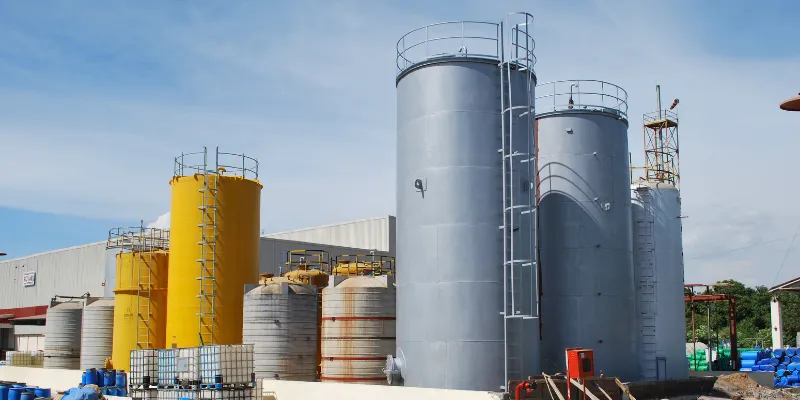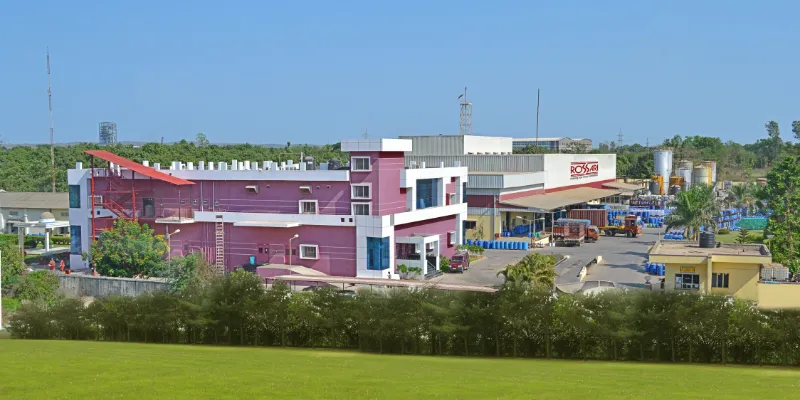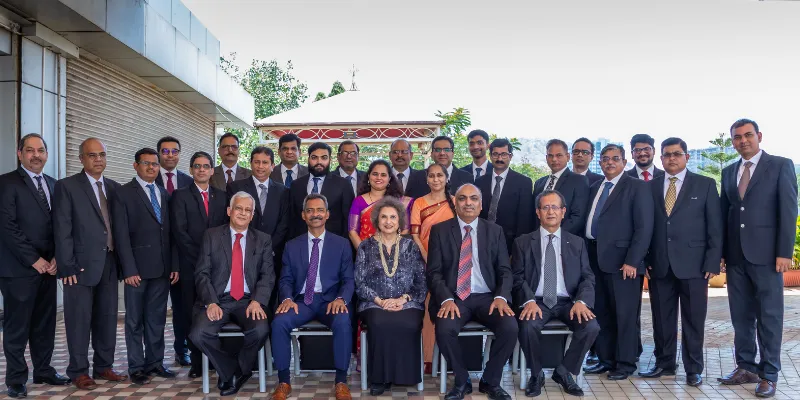How two friends built a Rs 600 Cr revenue business by making speciality chemicals
Sunil Srinivasan Chari and Edward Walter Menezes started Rossari Biotech in Mumbai to manufacture speciality chemicals for textiles. Here is how they grew Rossari into a leading speciality chemicals manufacturer and took it to IPO.
Having worked in textile processing, dyestuff, and speciality chemicals industries, it was natural for friends Sunil Srinivasan Chari and Edward Walter Menezes to start their own business in the same sector.
The budding entrepreneurs were looking to start a business supplying Indian speciality chemicals that met the needs of local industries. The seeds of the idea were sown back in 1997, and the duo formally incorporated the business in 2003 under the name .
“Our first investment was the acquisition of a 10-acre plot of land in Silvassa for manufacturing purposes. Later, in 2009, we renamed it Rossari Biotech Limited and began sustained efforts in product innovation, process improvement, and custom solutions in the speciality chemicals industry,” says Sunil, who is MD at Rossari.
Since then, the friends-turned-cofounders have grown Rossari into a large, Made-in-India speciality chemicals manufacturer. From textile chemicals, the Mumbai business has diversified into chemicals for the home, personal care, animal health, and nutrition segments.

A Rossari manufacturing unit
The founders claim the BSE and NSE-listed Rossari clocked Rs 600 crore revenue in FY20, and is now one of India’s leading speciality chemicals manufacturers.
In an exclusive interview with SMBStory, Sunil Srinivasan Chari and Edward Walter Menezes, who is chairman at Rossari, narrate the journey of the business and how the founders built it into a large-scale firm.
Edited excerpts from the interview:
SMBStory [SMBS]: What were the early days at Rossari like?
Sunil Srinivasan Chari [SSC]: When we started, we felt there was a need to provide speciality chemicals in a cost- and time-efficient manner. We began small yet our products were competing against established products from MNCs such as BASF and Clariant.
Our ex-professors advised us to not come up with a cheap, ‘me too’ product. So we emphasised on innovation so we could create a sustainable product line. Thus began our focus on sustainable products that not only act as green alternatives to harmful textile processing chemicals but have also become industry benchmarks now.
SMBS: What is the business model? What are some of the unique business strategies?
Edward Walter Menezes [EWM]: Sustainability is a strategic priority for us. We aim to deliver tailor-made, eco-friendly, and cost-neutral products, and penetrate deeper into new consumer segments and categories.
Our emphasis is to be able to provide chemical solutions that promote a cleaner, healthier and more efficient world, and ensure optimum eco-efficiency in everything we do. Being a company with a green ethos, our specialisation lies in replacing legacy harmful products with environmentally benign chemical products and processes.
We continue to invest in new chemistry to develop specialised products based on the foundation of eco-friendly processes as well as to provide increased performance and value to customers.
SMBS: How did you diversify into different speciality chemical categories?
EWM: Since we commenced our journey, the speciality chemicals industry has evolved and we kept pace with trends by realigning our strategies.
Currently, we are leading manufacturers of acrylic polymers, manufacturing 300 products, and serving key sectors in the home, personal care and performance chemicals (HPPC) segment.
While we primarily operate in a business-to-business (B2B) model for this segment, during the year, we also made a foray into ecommerce as we listed our HPPC products on the Amazon India platform.
We aim to strengthen this approach further enlisting our products on more ecommerce websites, and hope to gain a significant fillip to our revenue.
We also supply animal feed ingredients, animal feed supplements and pet grooming products, including products for weaning of infants and adult pets. We made a foray into pet grooming products with the acquisition of Brand Lozalo, a shampoo for pets. The portfolio has been further expanded by adding pet treats, pet food, and pet care products.

A Rossari Biotech factory
SMBS: Where does manufacturing happen? Do you own the manufacturing units?
EWM: Most of Rossari Biotech’s products are proudly Made in India, at our manufacturing plants located at Silvassa and Dadra and Nagar Haveli, with an installed capacity of 120,000 MTPA.
Considering the capacity at our Silvassa plant was constrained for products across all our verticals, we decided to de-bottleneck and commissioned a facility at Dahej, with an installed capacity of 132,500 MTPA.
The Dahej manufacturing facility is designed and equipped with state-of-the-art vessels, control systems and optimum safety provisions to handle a wide range of synthesis processes like polymerisation, condensation, esterification, resins, speciality emulsions, and granulation.
It is equipped to formulate these chemicals for various industries like home and personal care, textiles, paint and paper, construction etc.
SMBS: What is the USP of your chemicals?
EWM: Our chemicals are engineered to meet specific business needs for the best results with minimal effort. Our ability to deliver custom solutions in record time and in a sustainable manner is what differentiates us from our peers.
As we uphold international quality standards, we have emerged as a valued supply chain partner for several countries. Among the few Indian textile chemical companies recognising the strategic opportunities resulting from sustainability, we maintain a stringent focus on sustainable chemistry with enough foresight.
We have adopted several green initiatives to reduce carbon footprint and have implemented the best environmental practices for green manufacturing. We have also made substantial investments in Global Organic Textile Standards (GOTS) and ZDHC platforms, ensuring zero discharge of harmful chemicals.
SMBS: Who are your competitors?
EWM: Our business is spread across various segments, and we have peers who motivate us towards product innovation and efficient processing. Some of our competitions include Achroma, Dystar, Huntsman, Zydus, and Pedigree, among others.
We are staying ahead since we have several innovative offerings in our pipeline at our IIT Powai lab and are continuously working on product innovation and new products. The trend is that we need to be ahead of the market and for the last 23 years, we have been dealing with competition. We need to be sure and have the direction and products lined up for the growth of the company.

The Rossari Biotech leadership team
SMBS: What are some challenges you faced along the way?
EWM: At each stage of growth, we faced many challenges, such as access to finance, ramping up infrastructure, etc. For sustaining a business growing in size and complexity, we took strategic steps to become ‘future-ready’ by adding new capacities, value-added capabilities, as well as our continuous persistence and inventiveness.
We have been consolidating our position through our technological strengths, knowledge of science, manufacturing capabilities, and entrepreneurial spirit.
For instance, when we were to launch the IPO last year, the lockdown was announced. We waited for a while but we were courageous enough to face the market as we became the first IPO to be launched post the lockdown.
SMBS: How did the pandemic impact the business and what are your future plans?
SSC: The pandemic certainly caused unprecedented disruption across all business sectors and some of our markets faced a demand slump.
We had to pivot and quickly change our production to health and hygiene products (especially sanitisers). We also reaped the benefits of our investment into ERP as a tool to conduct the business, as a lot of the operations could still be done by teams remotely, which may not have been possible otherwise.
In the long term, there is a shift in perception towards home and personal care and that will benefit us as we already have a ready portfolio and pipeline of products in this segment.
The second wave of COVID-19 is further fuelling the demand for hygiene products. Even if the sanitiser business declines with time, we will begin to approach normalcy and that means our other businesses will be back on track. Our textile business will be back in place, and so will our paint and water treatment business.
Edited by Kanishk Singh







1552653967435.png?mode=crop&crop=faces&ar=1%3A1&format=auto&w=1920&q=75)


